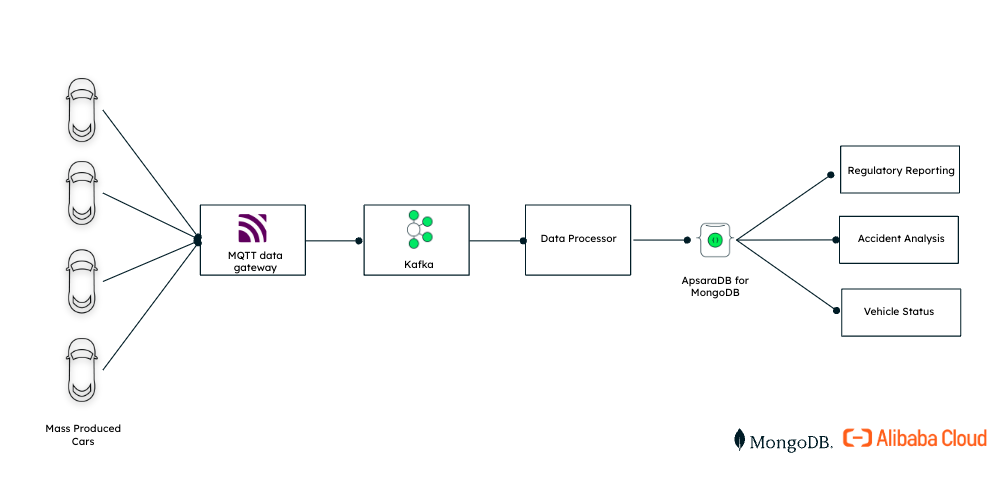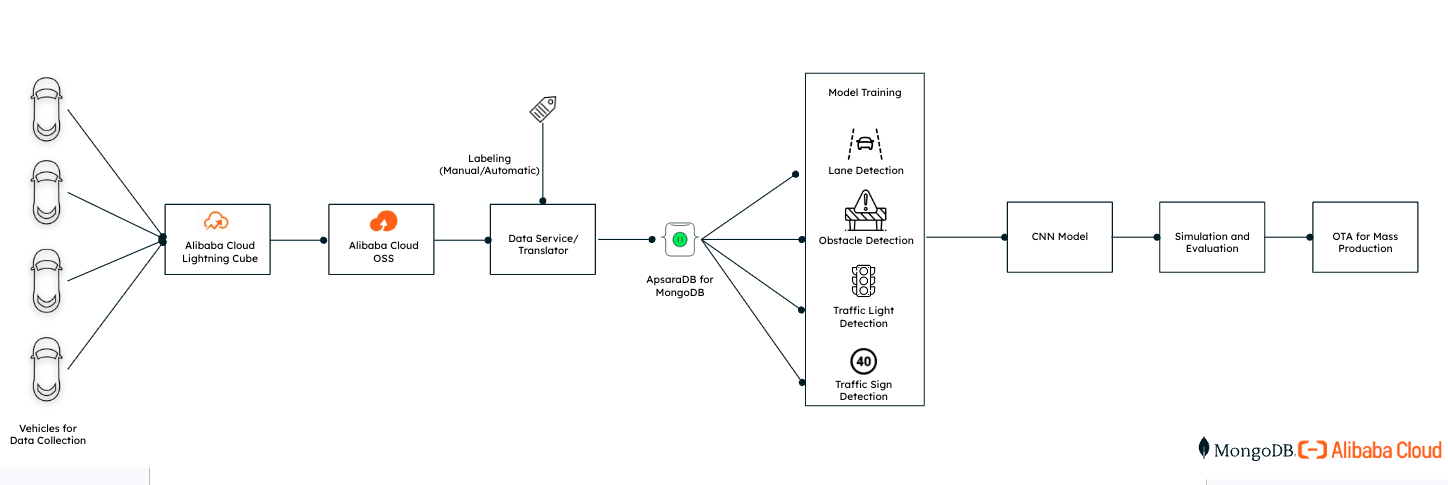This article was originally published on MongoDB, written by Dr. Humza Akhtar and Arnaldo Vera
The emergence of autonomous driving technologies is transforming how automotive manufacturers operate, with data taking center stage in this transformation. Manufacturers are now not only creators of physical products but also stewards of vast amounts of product and customer data. As vehicles transform into connected vehicles, automotive manufacturers are compelled to transform their business models into software-first organizations. The data generated by connected vehicles is used to create better driver assistance systems and paves the way for autonomous driving applications. It has to be noted that the journey toward autonomous vehicles is not just about building reliable vehicles but harnessing the power of connected vehicle data to create a new era of mobility that seamlessly integrates cutting-edge software with vehicle hardware.
The ultimate goal of autonomous vehicle makers is to produce cars that are safer than human-driven vehicles. Since 2010, investors have poured over 200 billion dollars into autonomous vehicle technology. Even with this large amount of investment, it is very challenging to create fully autonomous vehicles that can drive safer than humans. Some experts estimate that the technology to achieve level 5 autonomy is about 80% developed but the last 20% will be extremely hard to achieve and will take a lot of time to perfect. Unusual events such as extreme weather, wildlife crossings, and highway construction are still enigmas for many automotive companies to solve.
The answer to these challenges is not straightforward. AI-based image and object recognition still has a long way to go to deal with uncertainties on the road. However, one thing is certain, automotive manufacturers need to make use of data captured by radar, LiDAR, camera systems, and the whole telemetry system in the vehicle in order to train their AI models better. A modern vehicle is a data powerhouse. It constantly gathers and processes information from onboard sensors and cameras. The Big Data generated as a result presents a formidable challenge, requiring robust storage and analysis capabilities. Additionally, this time series data needs to be analyzed in real-time and decisions have to be made instantaneously in order to guarantee safe navigation. Furthermore, ensuring data privacy and security is also a hurdle to cross since self-driving vehicles need to be shielded from cyber attacks as such an attack can cause life-threatening events.
The development of high-definition (HD) maps to help the vehicle ‘see’ what is on the road also poses technical challenges. Such maps are developed using a combination of different data sources such as Global Navigation Satellite Systems (GNSS), radar, IMUs, cameras, and LiDAR. Any error in any one of these systems aggregates and ultimately impacts the accuracy of the navigation. It is required to have a data platform in the middle of the data source (vehicle systems) and the AI platform to accommodate and consolidate this diverse information while keeping this data secure. The data platform should be able to preprocess this data as well as add additional context to it before using it to train or run the AI modules such as object detection, semantic segmentation, and path planning.
MongoDB can play a significant role in addressing above mentioned data-related challenges posed by autonomous driving. The document model is an excellent way to accommodate diverse data types such as sensor readings, telematics, maps, and model results. New fields to the documents can be added at run time, enabling the developers to easily add context to the raw telemetry data. MongoDB’s ability to handle large volumes of unstructured data makes it suitable for the constant influx of vehicle-generated information.
MongoDB is not only an excellent choice for data storage but also provides comprehensive data pre-processing capabilities through its aggregation framework. Its support for time series window functions allows data scientists to produce calculations over a sorted set of documents. Time series collections also dramatically reduce storage costs. Column compression significantly improves practical compression, reduces the data's overall storage on disk, and improves read performance. MongoDB offers robust security features such as role-based access control, encryption at rest and in transit, comprehensive auditing, field-level redaction and encryption, and down to the level of client-side field-level encryption that can help shield sensitive data from potential cyber threats while ensuring compliance with data protection regulations.
For challenges related to effectively storing and querying HD maps, MongoDB’s geospatial features can aid in querying location-based data and also combining the information from maps with telemetry data fulfilling the continuous updates and accuracy requirements for mapping. Furthermore, MongoDB's horizontal scaling or sharding allows for the seamless expansion of storage and processing capabilities as the volume of data grows. This scalability is essential for handling the data streams generated by fleets of self-driving vehicles.
During the research and development of autonomous driving projects, scalable infrastructure is required to quickly and steadily collect and process massive data. In such projects, data is generated at the terabyte level every day. To meet these needs, Alibaba Cloud provides a solution that integrates data collection, transmission, storage, and computing. In this solution, the data collected daily by sensors can be simulated and collected using Alibaba Cloud Lightning Cube and sent to the Object Storage Service (OSS). Context is added to this data using a translator and then this contextualized information can be pushed to MongoDB to train models. MongoDB and Alibaba Cloud recently announced a four-year extension to their strategic global partnership that has seen significant growth since being announced in 2019. Through this partnership, automotive manufacturers can easily set up and use MongoDB-as-a-service AsparaDB for MongoDB from Alibaba Cloud’s data centers globally.

Figure 1: Data collection and model training data link with MongoDB on Alibaba Cloud.
When the vehicle is on the road, the telemetry data is captured through an MQTT gateway, converted into Kafka, and then pushed into MongoDB for data storage and archiving. This data can be used for various applications such as real-time status updates for engine and battery, accident analysis, and regulatory reporting.

Figure 2: Mass Production vehicles data link with MongoDB on Alibaba Cloud
For a company that is looking to build autonomous driving assistance systems, Alibaba Cloud and ApsaraDB for MongoDB is an excellent technology partner to have. ApsaraDB for MongoDB can handle TBs of diverse sensor data from cars on a daily basis, which doesn't conform to a fixed format. MongoDB provides reliable and highly available data storage for this heterogenous data enabling companies to rapidly expand their system within minutes resulting in time savings when processing and integrating autonomous driving data. By leveraging Alibaba Cloud's ApsaraDB for MongoDB, the R&D team can focus on innovation rather than worrying about data storage and scalability, contributing to faster innovation in the field of autonomous driving.
In summary, MongoDB's flexibility, versatility, scalability, real-time capabilities, and strong security framework make it well-suited to address the multifaceted data requirements and challenges that autonomous driving presents. By efficiently managing and analyzing the Big Data generated, MongoDB and Alibaba Cloud are paving the path toward reliable and safe self-driving technology.
Get started to learn MongoDB's popular scenarios and practice your skills with ApsaraDB for MongoDB, and earn the Alibaba Cloud x MongoDB Bootcamp certification for FREE!
[Infographic] Highlights | Database New Feature in July 2023
[Infographic] Highlights | Database New Feature in August 2023
ApsaraDB - December 22, 2022
Alibaba Cloud Community - July 25, 2022
Apache Flink Community - March 7, 2025
Alibaba Clouder - June 20, 2018
Alibaba Cloud Community - April 15, 2025
Alibaba Cloud Community - September 20, 2024
 Alibaba Cloud Academy
Alibaba Cloud Academy
Alibaba Cloud provides beginners and programmers with online course about cloud computing and big data certification including machine learning, Devops, big data analysis and networking.
Learn More ApsaraDB for MongoDB
ApsaraDB for MongoDB
A secure, reliable, and elastically scalable cloud database service for automatic monitoring, backup, and recovery by time point
Learn More Database Migration Solution
Database Migration Solution
Migrating to fully managed cloud databases brings a host of benefits including scalability, reliability, and cost efficiency.
Learn More Database Gateway
Database Gateway
A tool product specially designed for remote access to private network databases
Learn MoreMore Posts by ApsaraDB